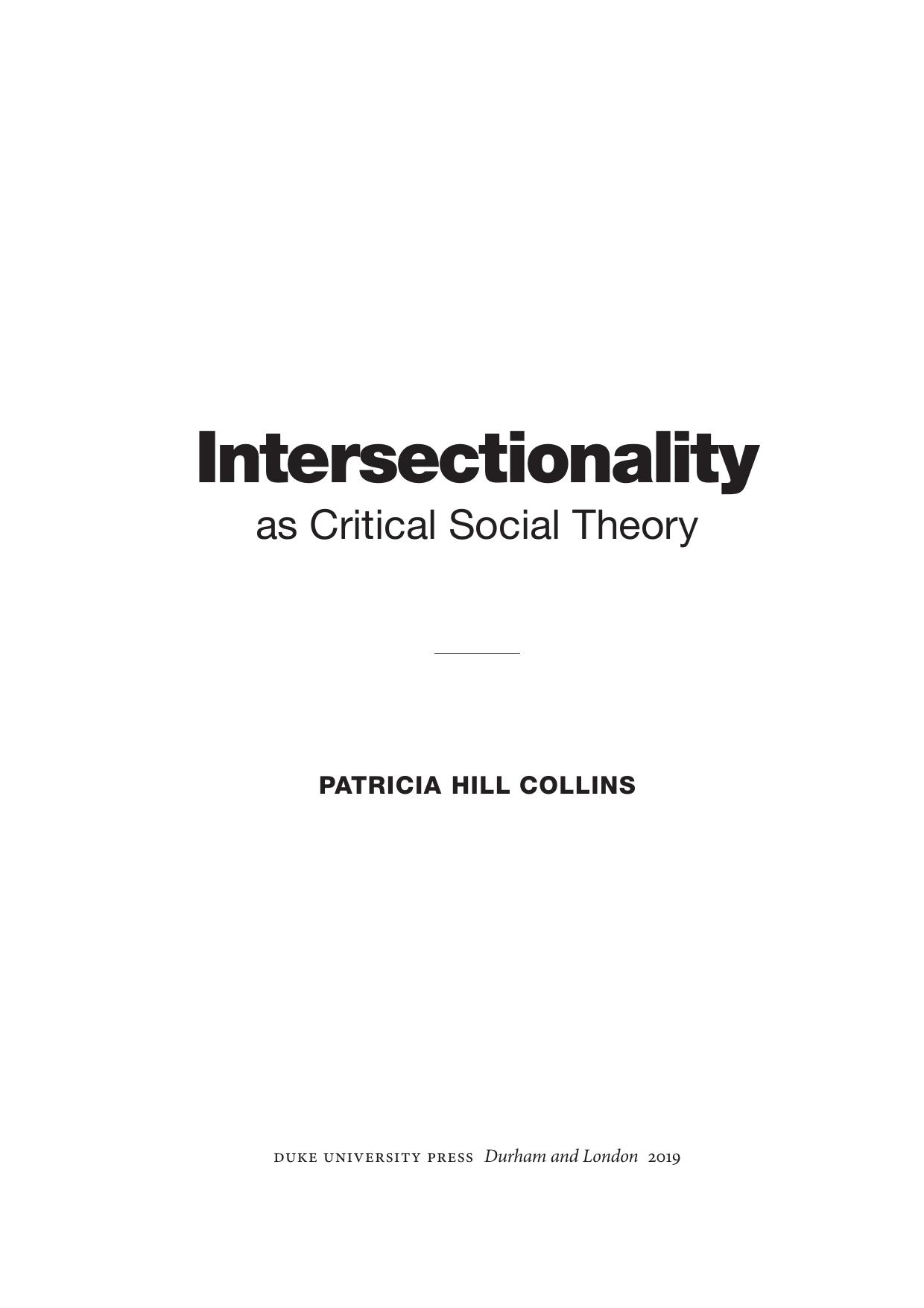Intersectionality as Critical Social Theory by Patricia Hill Collins

Author:Patricia Hill Collins [Collins, Patricia Hill]
Language: eng
Format: epub, pdf
ISBN: 9781478005421
Publisher: Duke University Press
Published: 2019-08-23T04:00:00+00:00
Intersectionality and Social Action
This chapter places intersectionality in dialogue with Black feminist thought and American pragmatism, two knowledge projects whose approaches to experience and community are relevant for intersectionalityâs critical content and methodology. Because intersectionality draws from multiple critical discourses, it navigates an array of competing and complementary knowledge projects. Unlike both Black feminist thought and American pragmatism, intersectionality is not tightly wedded to particular social groups and interpretive communitiesâAfrican American women for Black feminist thought or professional philosophers for pragmatismâbut instead has a much broader constituency. Unlike American pragmatism and, to a lesser extent, Black feminist thought, intersectionality has not yet crystallized into a canon with founding figures, a coherent narrative of its points of origin, and a list of its core tenets. Rather, narratives of intersectionality within academic settings remain contested concerning which perspectives on intersectionality will prevail. I see three implications of intersectionalityâs dialogical engagement with Black feminist thought and American pragmatism.
First, Black feminist thought and American pragmatism make important albeit different contributions to thinking about experience in ways that facilitate intersectionality as a critical social theory. Black feminist thought demonstrates the epistemological and political significance of theorizing from individual experience in the context of a community with shared experiences, identities, and standpoints (Collins 2000, 251â271). Experience constitutes a source of wisdom, a way of knowing that is democratic precisely because it does not depend on formal education. Using experiences to theorize is not a privileged way of knowing; rather, it is one way of knowing that may be better suited to specific questions than the content of formal social theories.
In this sense, the substance of experience matters in relation to diagnosing social problems and in figuring out ways to address them. Relying on experience as a way of knowing can bring wisdom to critical inquiry, but only if that wisdom itself remains under construction. Black feminist thought demonstrates this use of wisdom that informs social action in struggling with an important social problem. Historically, this broader project of Black feminist thought as resistant knowledge drew from and influenced the everyday political behavior of African American women in the social context of families, jobs, communities, and civic participation. It also shaped how African American women as leaders, intellectuals, and activists understood power and politics. This is important because Black women bring a distinctive sense of political action both to intersectionality and, potentially, to democratic political institutions, a sensibility that reflects how those at the bottom of social hierarchies theorize power and take political action in response to domination.
Such knowledge emphasized complex understandings of how domination is organized and operates (intersecting oppressions), as well as complex perspectives on political possibilities within such contexts (flexible solidarity). African American women were able to conceptualize intersectionality in conjunction with, and not in opposition to, their experiences of social action. The richness of Black feminist thought, and its ability to influence so many other resistant knowledge projects, points to the benefits of broadening intersectionalityâs context of discovery to include similar theorizing traditions whose creative social action rests on experience.
Download
Intersectionality as Critical Social Theory by Patricia Hill Collins.pdf
This site does not store any files on its server. We only index and link to content provided by other sites. Please contact the content providers to delete copyright contents if any and email us, we'll remove relevant links or contents immediately.
Navigation and Map Reading by K Andrew(4583)
Spare by Prince Harry The Duke of Sussex(4259)
Tuesdays with Morrie by Mitch Albom(3878)
Cracking the GRE Premium Edition with 6 Practice Tests, 2015 (Graduate School Test Preparation) by Princeton Review(3625)
What It Really Takes to Get Into Ivy League and Other Highly Selective Colleges by Hughes Chuck(3242)
Goodbye Paradise(3018)
Never by Ken Follett(2959)
Pledged by Alexandra Robbins(2811)
Kick Ass in College: Highest Rated "How to Study in College" Book | 77 Ninja Study Skills Tips and Career Strategies | Motivational for College Students: A Guerrilla Guide to College Success by Fox Gunnar(2734)
A Dictionary of Sociology by Unknown(2536)
Graduate Admissions Essays, Fourth Edition: Write Your Way into the Graduate School of Your Choice (Graduate Admissions Essays: Write Your Way Into the) by Asher Donald(2495)
Sapiens and Homo Deus by Yuval Noah Harari(2445)
Get into Any College by Tanabe Gen Tanabe Kelly(2396)
Machine Learning at Scale with H2O by Gregory Keys | David Whiting(2373)
Zero to Make by David Lang(2364)
The Social Psychology of Inequality by Unknown(2345)
500 Must-Know AP Microeconomics/Macroeconomics Questions(2259)
Harry Potter and the Prisoner of Azkaban (Book 3) by J. K. Rowling(2205)
Fairy Tale by Stephen King(2154)
